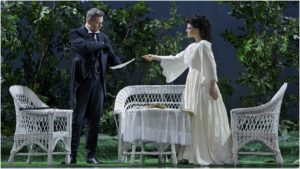
Finnish National Opera 2017-18 Review – La Traviata: Less-Than-Spectacular Singing Saved By Roasted Almonds At Intermission
By Ivan BerazhnyFor an opera lover, dismissing the local opera house is a sin. For that reason, I make it a rule to attend several performances every year in The Finnish National Opera, a few tram stops away from where I live.
This year started with “La Traviata.” This household opera brand is a sad three-act story of tuberculosis, bullying, and dying happy. Yet attending “La Traviata” is rarely a gloomy experience. The music can be quite waltzy, there is usually champagne on stage, romance in the countryside, a Spanish-themed party, and a sweet reunion of love before a very elegant death. And this is exactly how The Finnish National Opera decided to mark the festive season by bringing back Giancarlo del Monaco’s production of 1988. The décor is a white neo-classical kitch, the costumes are impeccable replicas of what Alexandre Dumas’ heroines would wear, and the stage lights make it all sparkle and glow.
Unfortunately, the staging by Giancarlo del Monaco was the best element in the performance. From the first vocal presence to the last orchestral burst, none of the cast managed to deliver visceral artistry. How could that happen?
Not Ready for Primetime
Enter Marie Fajtova, a Czech coloratura soprano, and Markus Nykänen, a Finnish lyric tenor. Fajtova’s thin timbre and dense vibrato feel more at home in such smaller roles as Frasquita or Annina , delivering little of the nuance and complexity for one of opera’s greatest heroines. Nykänen’s singing erred on the side of unstable and he had numerous episodes of forced notes and phrases cut short. Even if both sounded slightly better in their duets, the first act never quite delivered sufficient chemistry to make their love believable. Fajtova was inaudible in the lower register, while Nykänen focused on pathos in overacting, rushing with arms wide open, shaking his head with a jaw wrenching effort, and probably bruising his knees in certain demarches.
The second act confirmed that, on this night, Latvian conductor Ainars Rubikis was not in synch with his musical ensemble. He managed at least three times to lose track of the tempo, throwing the choir and the orchestra into the opposite directions. Fajtova pushed herself to the limits and almost became believable in her role. Her canary-like vibrato would get throaty, as if by force, and then a more solid sound would emerge. Perhaps, certain positions coupled with confidence allowed her putting more strength into the singing. Alas, such moments were rather occasional. She was still doomed both in drama and in singing by Jaako Kortekangas, a Finnish baritone of a moderate yet stable caliber, though his singing and acting never quite managed to create empathy.
The third act brought it all to an end: “Addio del Passato” felt rushed and Rubikis’ conducting somehow felt long and overstretched. Even the staging was a bit off kilter, Violetta’s bed all the way on the far stage left, far away from the viewer, and preventing much intimacy with the heroine’s plight. Furthermore, she was dying there, both Alfredo and Germont faced the audience downstage, away from her, doing away with any potential for intimacy in this most private of moments.
On the brighter side, the voice of Violetta’s doctor was the world class: Jyrki Korhonen filled the entire house with just one vowel. Alfredo’s father also gave an interesting twist: as soon as Violetta died, he marched, happily, out of the room, as if the only reason he came was to get reassured that the woman certainly dies and leaves his son in peace.
But…
Many performances here are bland, cold, and should be hidden from a novice operagoer. Yet, at times, The Finnish National Opera brings the yet unknown future stars and the stars already in decline. “La Traviata,” however, was not the case.
It was a safe bet, for a New Year minded audience, who would enjoy clicking off their heels in a fancy hall and order glasses of bubbly. And so did I and my colleague. We went for tea and honey-glazed almonds. Their sweet taste, sincere laughter and warm friendship made this opera night actually fun.
When it comes to my next “Traviata,” I will look out for a dramatic soprano, or at least a spinto. If ever Ermonela Jaho or Sonya Yoncheva come to sing this part to The Finnish National Opera, I would then take the tram and give my local opera house a chance to recover.


